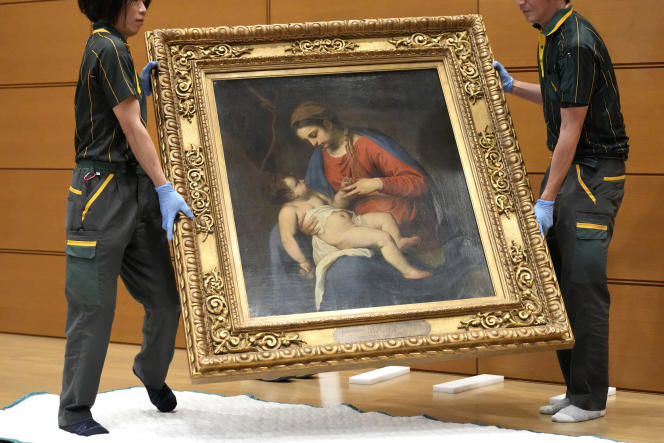found in Japan, The Virgin and Child, by the Italian painter Alessandro Turchi (1578-1649), was returned to Poland on Wednesday May 31. The painting was part of the works looted in this country by the Nazis during the Second World War. The case highlights the ambiguous situation of the Archipelago, sometimes considered a paradise for looted works of art.
The ceremony organized for the return of the work to the Polish embassy in Tokyo put an end to a procedure started after its discovery, in January 2022, during an auction in the Japanese capital. Spotted by an official from the Polish Ministry of Culture, it was withdrawn from sale. An investigation revealed that it was stolen by the Nazis in 1940 from the Lubomirski Palace in Przeworsk, southern Poland.
The current owner, who remains anonymous, has agreed to return it for free. Piotr Glinski, Polish Deputy Prime Minister, indicated that the work could be installed in the Museum of Princes Lubomirski, an institution under construction in Wroclaw, in the south-east of the country.
No legislation on Nazi looting
The restitution is a success of the Polish policy of repatriation of the works looted during the war by the Nazis and the Soviet troops. “More and more looted objects appear in auctions because memory is fading and the owners do not know where the works of art come from”explained Agata Modzelewska, head of the department of the Ministry of Culture, in charge of the restitution of these goods.
This is the first time that a work looted by the Nazis in Poland has been found in Japan, explained the Polish authorities, who however did not establish how the Turchi painting, sold at auction in New York at the end of the 1990s, had landed in the Archipelago.
The affair did not make much noise in a Japan where the question of the restitution of looted works is hardly debated. There is no legislation or case law relating to art looted by the Nazis. The Civil Code provides that a person who owns property for twenty years automatically becomes its owner. It was not until 2002 that Japan ratified the Convention adopted in 1970 by UNESCO for the prevention of the illicit import, export and transfer of ownership of cultural property. This text was the first legal instrument for the protection of cultural property against looting and illegal sales.
You have 43.9% of this article left to read. The following is for subscribers only.
